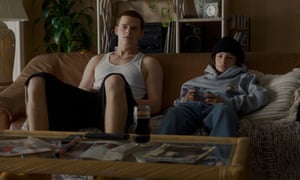Mid90s successfully joins the ranks of the famed coming-of-age movies, along with the revered Dazed and Confused, The Perks of Being a Wallflower, Stand By Me, and countless others. More specifically, it falls into the skater-subset. Like its predecessors, Lords of Dogtown and newer Skate Kitchen, Mid90s illustrates the singular period of the most change that you will ever experience with skateboarding. Mid90s works because, while still being quite authentic and respectful of its skateboarding roots, everyone, not just the skate heads, can appreciate and empathize with the character’s feelings.
When Stevie, the main character, lands his first ollie, everyone can understand the feeling he has. Even if you haven’t had the experience of landing an ollie, the feeling of finally getting something after struggling with it is universal. Mid90s wins by playing with skateboarding’s new uptake in popularity: just stick your head in the nearest high school and the number of flame-marked Thrasher shirts will be stifling.

Image via The Guardian
Mid90s focuses on Stevie, a thirteen-year-old growing up in Los Angeles. The movie not only focuses on his personal maturity, but also of his maturing skateboarding skills. Stevie lives with his overbearing, abusive older brother and his mother. As the movie progress, Stevie’s acceptance into his new group of friends also moves along. Stevie’s introduction into his new group is accurately portrayed, featuring him testing out nicknames and figuring out what to say and what not to. Stevie finds his “tribe” while drinking, skating, and getting high as he experiences many firsts over the course of the movie.

Some of the cast of Mid90s. Image via PhillyVoice
Mid90s exhibits the underside of each character, which gives more context to their actions. The audience sees Stevie’s guilt, his mother’s contempt for having children and various other character’s major motivations. This works to create an emotional and layered movie, which leaves an impact on the audience. Reuben is shown to have an abusive and drug addict mother. Another major portrayal is ‘Fuckshit’s’ animosity and jealousy towards Ray, which grows the more intoxicated he becomes, leaving his party lifestyle to become a reoccurring theme.
Mid90s is Jonah Hill’s directorial debut. Famously known for acting in Superbad, The Wolf of Wall Street, and countless other movies, Hill surely took set experience into the creation of his newest offering. Hill grew up as a “shop kid” hanging around at his neighborhood skate shop when he was growing up. The movie is packed with obscure skate references, from 90s specific skate shoes to iconic skate parts and brands, Mid90s effectively transports us back in time with no evidence of the current years. In a recent interview for the Associated Press, Hill said, “A Doritos bag has a wildly different shape and aesthetic now than it did in 1995.”

Image via Maxim
Mid90s‘s drawbacks come with the issue of making a movie about a time 25 years in the past when society has progressed and improved infinitely since then. Women are portrayed barely in the movie. While used to show Stevie’s maturing, women aren’t really portrayed as anything other than a vehicle for a man’s emotional and physical changes, with little of their own substance. Despite the fact that there were many recognized women like Elissa Steamer, Patti McGee and Peggy Oki active before and during the 90s skate scene, and that plenty of regular girls were skateboarding in 90s, no women in Mid90s were featured as skateboarders.

Image via WWD
Even today, inequality in skateboarding remains a huge issue, ranging from less contest winnings to sponsorship opportunities. In interviews, Hill has said that Mid90s is also meant to be a commentary on toxic masculinity and homophobia, but in the movie it seems as if he’s just documenting that it happened in the 90s, and not trying to actually do anything with it. A rare breakthrough happens during a conversation between Ray, an aspiring pro-skater who all the others look up to and want his validation, played by pro-skateboarder Na-kel Smith, and Stevie. The two discuss how everyone has a skeleton in their closet, and how at the end of the day, you probably wouldn’t want to switch lives with someone else.
Overall, Jonah Hill has certain elements that work to break down toxic traits, but his idea is not completely executed well. Mid90s lacks a clear defining breakthrough, there is no point where the audience could pinpoint a change. These moments of toxicity, both homophobic and sexist, exist, but are not really commented on. Hill shows that these things were rampant in the 90s, but provides no nuanced explanation or commentary on them. This has lead to interpretations of the film as being sexist, homophobic, and racist. Overall, Jonah Hill was able to include authentic moments of inequality and discrimination in Mid90s but goes no further than just showing them.
Mid90s was a very enjoyable film to see. The cinematography was beautiful and the soundtrack was perfect. Skate-edit inspired credits mark the end of the movie. However, I wish that me and other female skateboarders would be able to see a reflection of ourselves in a movie. For example, The Skate Kitchen did just that. By showing a diverse and real-life group of friends, director Crystal Moselle showcased an often forgotten branch of skateboarders. Especially with the huge issue of sexism in skateboarding, more representation will help to break down preconceived notions of what skateboarding is. It’s an art form that anyone and everyone should be able to take part in. Inclusion will always be important, and hopefully, skateboarding movies will start to remember that anyone of any gender can step foot onto a board.
Featured Image via Thrillist










